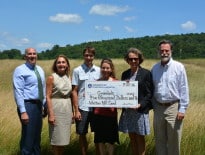Robert M. Driscoll
Title: Senior Vice President, Residential and Consumer Lending, Blue Hills Bank
Age: 42
Experience: 21 years
Bob Driscoll got into the mortgage business by happenstance – and OK, he needed another co-op, too. Then a student at Northeastern University, he walked into Hyde Park Savings Bank and asked about a job. He’s been with the same organization ever since, through its transformation to Blue Hills Bank today. Now the head of residential and consumer lending, Driscoll says of his accidental profession, “I’ve been hooked ever since. It’s just a business that got into my blood somehow.”
Q: How are you feeling about the interest rate environment? Is your business more skewed toward purchases or refis right now?
A: They’ve never been this low, which is great opportunity for first-time homebuyers. We haven’t seen as many refis. I don’t know if that’s just refi fatigue or if we just haven’t seen the applications come soaring in like I would have expected. Rates are in the low 3s, and there is a subset of the population out there that’s ready to refi, but some of these people have refinanced every year for the last several years. … It is a different process with some of the regulatory changes, so it’s not as easy.
But throughout this all it’s been nice to see that the purchase market is really what’s been driving our origination. And that shows me that we’ve got some good penetration in certain markets that’s helped us grow what we have. It hasn’t been a refi bubble that’s gotten us here. That makes me feel better.
Q: Do you have any concerns about low inventory? What kind of effect is that having on the market?
A: When I’m talking to my Cambridge or Newbury Street office, it’s different than when I’m talking to my Franklin office. The two markets are somewhat analogous in that there’s not a lot of inventory, therefore the price per square foot is extremely high and therefore it’s extremely competitive. You also have international influences that are sometimes playing and wreaking havoc because there are cash buyers coming into the market.
Those two markets specifically create issues for borrowers in terms of, I would say, fatigue. We worry about how many offers. Purchasing a home is emotional and when you have to go through three to five offers and all over asking. That’s what we’re hearing: 10 percent over asking, rejected out of hand, 15 percent over asking, rejected out of hand. That’s emotional. And we saw a little bit of a migration from Boston to some of the suburbs because they felt like it was a less competitive market.
So there’s no question we’re seeing the lack of inventory wreak havoc in that market, but in the suburbs we’ve seen a little bit of the opposite. We’ve seen buyers getting in, we’ve seen at least in Franklin and also Winchester, an influx. They’re refi-heavy in Newbury Street and that area, but as far as our outside suburban markets, we’ve done quite well in the purchase market.
Borrower fatigue is something that we talk about in this office at our sales meetings. At some point these borrowers are just going to say, “It’s not the right time,” especially the first-time homebuyers. For somebody who’s not experienced this process before, it’s not necessarily a positive one. You’re not used to saying, “You’re going to have to pay 15 percent over asking, right away” when asking is a million-five. That takes away a lot of the first-time entrants into that market.
I think that’s what happens when you have the competitiveness of the Boston market. There is fatigue and people give up and say, “I’m gonna look for alternatives.” And those alternatives help create booms in other markets, whether it’s South Boston, JP, Roslindale. There’s a lot of value being created from the competitiveness in Boston and people leaking back out. … Now you wonder where the next community is.
Q: Where do you think the next community is going to be?
A: I’m looking at Dorchester, Roxbury – and I’m not saying Mission Hill, but the Roxbury Crossing area. You have areas that really haven’t had revitalization to its fullest, but you’re starting to see it emerge. I’d love to see Hyde Park. I think Hyde Park could be one of those that people look at and start to invest in a little bit. That’s been a sleepy spot, and I think there’s opportunity for people to invest in there.
The generation that’s buying now, they’re not striving for the suburbs. They want to be in clusters, but they can’t necessarily afford to be in cluster A, so they’re going to look for the next best opportunity. It’s still urban, and they’re going to find little pockets, little towns where they can be in Boston relatively quick, upwardly mobile, have the restaurant vibe, all the things that they want.
East Boston, I think, has a real opportunity to come back. East Boston and Chelsea. I know Chelsea seems strange, but there’s a lot of opportunity there. It’s right there, there’s proximity to Boston. All of the things that attract people to South Boston is exactly what Chelsea could provide. Someone has to make that leap and start to revitalize.
Driscoll’s Top Five Must-Watch Movies
- “A Few Good Men”
- “The Town”
- “Knock Around Guys”
- “Rush Hour”
- “Taken”








